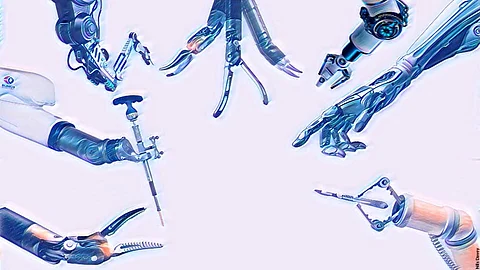

The multi-limbed da Vinci can be utilized in a variety of procedures, including cardiovascular, colorectal, gynaecological, head and neck, thoracic and urologic medical procedures, however, only if they're minimally invasive.
How large the market could be is as yet hazy, yet experts concur the potential still can't seem to be tapped. So more players are moving in, and rapidly. As the beginning of robotic surgery offers an approach to increasingly precise control and better patient results, early pioneers like Intuitive Surgical Inc. are seeing increased pressure from large organizations like Johnson and Johnson and Medtronic PLC, which have made major M&A investments to break into the market as of late.
Intuitive's da Vinci system was first affirmed by the U.S. Food and Drug Administration in 2000 for urology. From that point forward, the number of organizations staking their future on the developing space, either in general surgery or orthopaedic has just grown. Examination firm GlobalData reported in November 2019 that the surgical robot market is relied upon to reach $275 billion by 2025, nearly significantly increasing in size compared with 2018 when the market represented $98 billion.
The reason behind this mind-boggling growth rate is that robotics can revolutionize practically any kind of medical surgery, including cardiology, oncology and neurology. It is simply an issue of how the advancements can be applied.
Medical clinics are adopting the surgical robots at increasing rates, with general surgery procedures techniques utilizing the da Vinci system rising 32% from 2017 to 2018. GlobalData said robotics is one of the most encouraging technologies changing the essence of healthcare services.
Medtronic, Johnson and Johnson, Siemens Healthineers, Stryker, Zimmer Biomet and others have systems in different phases of advancement or commercialization, as robot-helped surgical procedure moves past general surgery into progressively novel regions, for example, lung biopsy.
The rising investment in the sector will keep on boosting both awareness of the innovation and the number of surgeons trained on robotic surgery platforms," EY said in a recent industry report. Furthermore, the intensifying rivalry will cut down the expenses related to robotic surgery procedures.
J&J's $3.4 billion acquisition of Auris Health in 2019 gave the medtech goliath a robotic diagnostic and therapeutic endoscopy platform called Monarch for applications in lung cancer. As a major aspect of the deal, J&J likewise picked up the services of previous Auris CEO and founder of Intuitive Frederic Moll and his group.
J&J CEO Alex Gorsky said in January its Auris and Verb Surgical teams are teaming up to build a platform that will be set up for the next several decades. More details on the project are scheduled to be shared at the organization's medical devices investor day on May 13.
In the meantime, Intuitive is hoping to reinforce the case for its advances to address a more extensive scope of conditions, including lung cancer. The organization is considering a way to deal with robotic surgery procedure with its Ion platform, for lung biopsy of suspicious nodules that includes access through the patient's mouth. Separate investigations are assessing lobectomy in lung cancer patients utilizing da Vinci.
In the meantime, J&J has collaborated with Google on an organization called Verb Surgical. Experts are uncertain about what system the team is making. They do anticipate that it should enter the robotic surgery market in 2020, however. Simultaneously, Medtronic is banded together with Mazor. Medtronic likewise anticipates its own robotic surgery system to launch in 2020.
It's not unreasonable to recommend Intuitive could keep 80% of the market. New robotic surgery companies should differentiate themselves. They can't have a clear, 'me too'' product. Financial specialists have put a pretty punchy attractive valuation on Intuitive Surgical on the grounds that they're still in the early stages of this robotic conversation. This market is sufficiently large to support various players. That's where organizations like Mazor and Zimmer Biomet, which makes systems called ROSA, come in. Both have systems that surgeons use in the cerebrum and spinal surgeries.
While Medtronic is the early leader in the space, others are getting ready to mount challenges, keeping in mind the hopes of stimulating demand in what for a considerable length of time has been a slow market in spinal procedures. Stryker, Zimmer Biomet and NuVasive all are working on robotic systems for the spine, however, when those contributions will hit the market is muddled.
Stryker has said it is seeking after a sign for its Mako platform in the spine segment, however, has not yet uncovered a course of events to market for the application. Zimmer Biomet got FDA clearance in March 2019 for its Rosa system for spine medical surgeries yet is concentrating on launching its robotic partial knee and hip applications before it directs its concentration toward the spine.
NuVasive has additionally been chipping away at a robotics application for its integrated spine surgery platform, called Pulse. In an update to investors a week ago, NuVasive executives said the organization has been working through beta assessments of the innovation for the last few quarters, with plans presently to launch the system in 2021.
Join our WhatsApp Channel to get the latest news, exclusives and videos on WhatsApp
_____________
Disclaimer: Analytics Insight does not provide financial advice or guidance. Also note that the cryptocurrencies mentioned/listed on the website could potentially be scams, i.e. designed to induce you to invest financial resources that may be lost forever and not be recoverable once investments are made. You are responsible for conducting your own research (DYOR) before making any investments. Read more here.
